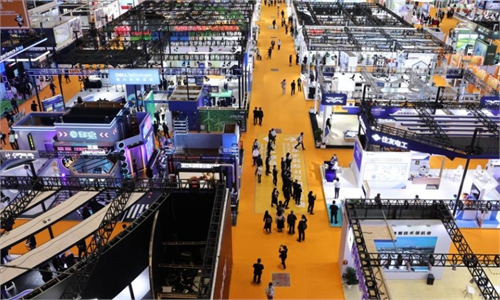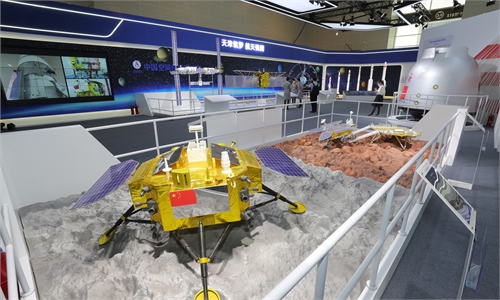
AI Photo:VCG
Artificial intelligence (AI) is a "positive energy accelerator," "AI will gradually become a core force to drive media development…" Chinese internet companies, media agencies and scholars acknowledged the great opportunity brought by new technology to online content, meanwhile acknowledging the huge challenges such as security risk ahead.
Both opportunities and challenges come along as AI generated content are penetrating into online content production, Yu Yonghe, the head of bureau of internet management techniques, the Office of the Central Cyberspace Affairs Commission (CCAC) said when he addressed the China Internet Media Forum held in Nanjing, East China's Jiangsu Province on Friday.
China's AI application should adhere to the correct orientation and industry operators should strengthen self discipline, Yu noted.
The Forum also saw representatives from China's Twitter-like Sina Weibo, Baidu technology, and local media organizations including Sichuan Daily and Jiangsu television and leading industry scholars. They agreed that the opportunity is greater than challenges and are positive toward utilizing constant technology innovation to enrich the media industry.
Wang Ying, vice president of Baidu viewed AI as a "positive energy accelerator" that makes internet platforms safer and warmer.
Wang Ying took the online community Baidu Tieba as an example, saying some 80 million users on the platform that is largely powered by AI, can not only express and share and achieve themselves, also reach out to help others.
The AI-power Baidu Tieba can effectively identify and filter illegal content, even if the content producers attempt to take little tricks such as pinyin, homonym, character demolition to escape platform supervision, Wang Ying further said.
Similarly, Wang Wei, COO of Sina Weibo told the forum that, from the social media platform's content understanding, users understanding to content supervision and recommendation system, they are all powered by AI technology.
The deep learning model developed by Sina Weibo is able to analyze online content and identify emotional expressions such as those spread inappropriate content and vulgarity, and protect those users who might suffer from cyberspace attacks, Wang Wei noted.
The Xinhua News Agency also set up multiple innovation platforms and products related to 5G, AI and XR technology in order to boost the competitiveness, according to the head of Xinhua News Agency Liu Jian.
While acknowledging the trend of technological development, how to use AI technology to advance productivity while maintaining safety is a question being faced by all quarters of society.
Yu encouraged the development of a more personalized AI algorithm with more accurate and effective content to meet up diverse demand. It is necessary to establish and improve their capability to identify illegal and undesirable information in order to maintain the clear order of cyberspace.
Upholding the belief of developing AI through a group of experienced teams, we're confident that AI will gradually become a core force to drive media development and create more value to the society, said Wang Wei.
As domestic industry players have been intensively launching related services amid the worldwide ChatGPT frenzy, China's cyberspace authority in April reacted quickly and issued a content regulation draft for AI, voicing clear support for innovation, promotion and application in AI algorithms and frameworks, meanwhile, calling for efforts to ensure fair competition and promote of healthy information.
According to the draft rules by the Cyberspace Administration of China (CAC), operators are asked to report to regulators for safety reviews before providing such services to the public, and are urged not to use advantages like algorithms, data and platforms to engage in unfair competition.
The CAC also lays out the ground rules that generative AI services have to follow, including the type of content these products are allowed to generate, saying that companies should ensure the accuracy of information and not generate false information.
Ensuring that intelligent algorithm technology is used for good is a challenge. What worthy noting is that no matter how the technology develops, its ultimate goal is to serve human beings. If the technology cannot be user-centered, it will be derailed from its original intention, said Shen Huawei, a research fellow from Institute of Computing Technology, Chinese Academy of Sciences at the forum.



